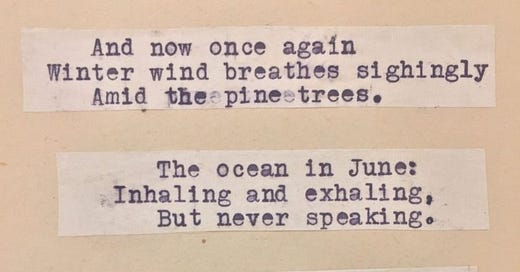“…worried as we all were by his drastic weight loss (the haiku must have been light to carry) and the strange slowness of his recovery, we did not immediately establish a link between his daily poetic exercising and his ailing health…I believe his haiku were self-developed antidotes against illness, and that breaking down words into syllables match the shortness of his breath, especially on the bad days…”
from the introduction of Haiku: The Last Poems of an American Icon
At the end of his life, the author Richard Wright (Native Son, Black Boy) took on writing haikus, and by the time he passed away, he had written four thousand (read it again!) of them. 817 are published in a small book simply titled Haiku. He wrote them ardently, “he was never without his haiku binder under his arm,” his daughter, Julia, details in the introduction. Wright was healing from illness, still often unwell and dealing with lingering symptoms.
He was also mourning the death of many influences in his life, including his editor, a close friend, and his mother. Julia Wright shares her experience of her father learning of his mother’s death and the unique silence that resonated through their home, and the “self-nurturing” she imagines the haiku aided in.
(30)
A bloody knife blade
Is being licked by a cat
At hog-killing time(39)
A soft wind at dawn
Lifts one dry leaf and lays it
Upon another(122)
And what do you think.
O still and awesome spider,
Of this summer rain?(422)
My cigarette glows
Without my lips touching it, —
A steady spring breeze(459)
I am paying rent
For the lice in my cold room
And the moonlight too.(684)
As my delegate,
The scarecrow looks pensively
Into spring moonlight
The haiku is an economical form where the essence of a moment is sustained and supported by the poem’s brevity. It doesn’t linger about. You may concern yourself with the white space around it, the background— the sound of the summer rain, the house the cat emerged from— or you can choose to stay in the foreground, the frame of those three lines. There’s still so much there.
I’ve been holding the information about Richard Wright’s haiku in the back of my head for a few months, casually checking the poetry section of any bookstore I find myself in. I don’t have a strong relationship to the form— I think any time I’ve read a haiku, I’ve just kind of let it wash over me. But as I sink into the many transitions happening in my life, I’ve been curious about what feels like a tendency to complicate what can be clear. So many of my desires and so much of my internal processing require more space—I tend towards cluttering that otherwise clear understanding. The need to self-soothe and grieve in small pieces feels true in my heart.
I’m writing to you fresh off a week of dancing in rural Maine for the second summer in a row. The workshop ended on Saturday, and I stayed behind for a couple of days to spend time with friends, swim, and rest. Last night, before falling asleep, I started panicking about being in the world again, my work, and my birthday, which is coming up. Then this afternoon I swam in the lake and felt kind of fine about everything, just finding great comfort in what was right in front of me —
Floating on top of
The river, supporting my
Back—light to carry.




